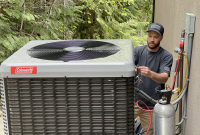Support strong Canadian climate journalism for 2025
Ottawa resident Joan Lawrence says the key to living without air conditioning is all about “pacing yourself.”
“Calm down, move more slowly, get things done first thing in the morning before the sun gets too hot,” she says. “Work with the heat, rather than against it.”
Lawrence grew up without AC and has lived in tropical climes as an adult, so she believes she may be better acclimatized than some to high heat and humidity. Even though her Ottawa home has AC, by August, she still hadn’t turned it on even though temperatures have frequently cracked 30 C. “I told my husband we really should turn it on just to make sure it is still working,” she laughed. She adds they also have a couple of large, mature trees that help keep their house cool.
It’s a choice they make to reduce their carbon footprint. Air conditioners are a major source of greenhouse gas emissions because they emit hydrofluorocarbons (HFCs), man-made industrial chemicals used mainly for cooling and refrigeration. The Climate and Clean Air Coalition also says HFCs are nearly 4,000 times more damaging to the climate than carbon dioxide over a 20-year period.
The International Energy Agency reports energy consumption for space cooling has more than tripled since 1990 and continued to grow in 2020, driven in part by people spending more time at home.
As we experience more episodes of extreme heat, keeping buildings cool is “a matter of life or death,” says Stephen Thomas, a climate solutions policy analyst with the David Suzuki Foundation.
“We need to move quickly and decisively away from fossil fuels to clean energy, such as solar and wind power,” he says. That, coupled with “deep energy retrofits, will make our homes more comfortable so that the use of cooling can be encouraged to keep people healthy.”
You may not be ready to turn your AC off entirely, but you can use it less, reduce your greenhouse gas emissions and lower your electricity bill since some AC units can burn more electricity than any other household appliance.
Here’s how:
- Close your windows, drapes and blinds first thing in the morning to trap cool air, then open them at night after the sun has gone down.
- Invest in insulated blinds. “We find those terrific,” Lawrence says. “As soon as the sun starts beating down on any particular window, the windows are shut, those blinds go down and the doors are closed. Then when the sun moves around, we open the blinds again and crack the window or door open to get fresh air.” She says the blinds are equally efficient at keeping the heat in during the winter months.
- Bamboo blinds are another smart practice borrowed from tropical countries to deflect heat. You can also purchase rolls of tinted window film at many hardware or automotive stores. The film can be cut to fit your window to deflect heat and reduce glare and ultraviolet rays.
- Avoid using the oven, but if you must, “put it on at 6 a.m.,” Lawrence advises. “We also have a door about one metre from the oven, so I use a fan to blow the hot oven air out the door instead of letting it dissipate through the house. That really helps.”
- Wear loose, cotton clothes. “Get rid of that polyester for a whole variety of reasons,” she says.
- Use ceiling fans or oscillating floor fans as needed.
- Turn off any unnecessary lights — they all generate heat!
- Have a cold shower before going to bed.
- Keep your pillows in the freezer until bedtime.
- Put your feet in a basin of cold water.
- Work from the basement if you have one.
Lawrence says if it gets to the point where they just can’t stand the heat and humidity any longer, or they have guests who have breathing issues, “we set the AC to 25 C, which reduces the humidity tremendously but doesn’t chill the house and therefore uses far less energy.”
Her final tip: never underestimate the cooling power of “a couple of gin and tonics.”
One Small Thing You Can Do Right Now is a monthly column on everyday actions we can all take to help save the planet.
Please share your ideas on being more environmentally responsible in the comments section below.
Becky Rynor is a journalist based in Ottawa.






Comments
Great story! A further small tip: wet towel on the nape of your neck. Cools you right off!
I wonder also about hydrofluorocarbons. Canada is supposed to phase out hydrofluorocarbons in refrigeration and air-conditioning under the Montreal protocol and its Kigali amendment. Here are the new regulations that Canada adopted in 2018: https://www.canada.ca/en/environment-climate-change/services/canadian-e… It might be worth while writing a follow-up story about how this is going. A couple of years ago when we were buying a new fridge and wanted to avoid HFCs, we did manage to find a model that runs on propane but the majority of the appliances being sold hadn't switched yet.
As climate heats up, AC will become a necessity for many populations. I entirely agree with the article that a healthy person can and should avoid using AC for a temperature of 30. But for the elderly and people with chronic conditions, and all of us as temps in Canada nudge 40, air conditioning may be a matter of life and death. Our government needs to do its job so that people can keep (reasonably) cool while avoiding emissions.